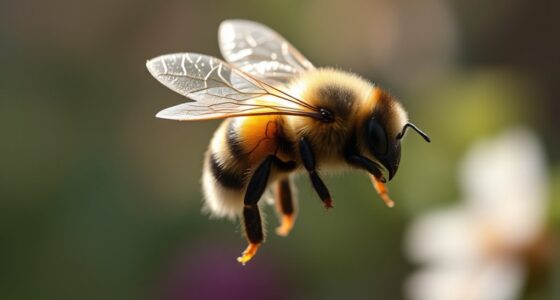Synthetic biology now allows you to engineer bacteria that produce jet fuel from renewable resources. By designing sophisticated genetic circuits and tweaking natural metabolic pathways, scientists enable bacteria to efficiently synthesize hydrocarbons suitable for aviation. This approach offers a sustainable alternative to fossil fuels, reducing environmental impact and dependency on traditional resources. As advancements continue, you’ll discover how these innovations are shaping the future of eco-friendly energy solutions and transforming industries worldwide.
Key Takeaways
- Researchers engineer bacteria with advanced genetic circuits to precisely control hydrocarbon production for jet fuel synthesis.
- Metabolic pathways are modified to optimize bacteria’s conversion of renewable resources into fuel compounds.
- The approach offers a sustainable, scalable alternative to traditional fossil fuels, reducing environmental impact.
- Genetic circuits act as biological switches, enabling reliable and efficient microbial fuel production.
- Advances in synthetic biology are paving the way for greener air travel and innovative energy solutions.

Synthetic biology has recently revealed a groundbreaking technique that could revolutionize medicine, agriculture, and environmental management. This new approach involves engineering bacteria to produce jet fuel, a feat made possible through sophisticated genetic circuits and metabolic engineering.
By designing precise genetic circuits, you can control how bacteria behave and respond, effectively programming them to carry out specific tasks such as synthesizing hydrocarbons that resemble traditional jet fuel. These genetic circuits act like biological switches, turning on or off certain pathways within the bacteria, ensuring they produce fuel efficiently and reliably.
Metabolic engineering plays a pivotal role in this process. It involves tweaking the bacteria’s natural metabolic pathways to optimize the production of desired compounds — in this case, jet fuel. You identify and modify key enzymes and intermediates within the bacteria’s metabolism, redirecting their biochemical processes to favor fuel synthesis.
This precision allows you to harness the bacteria’s natural capabilities, pushing them beyond their usual functions to generate high yields of hydrocarbons suitable for aviation fuel. The combination of genetic circuits and metabolic engineering means you can fine-tune bacterial production systems, making processes faster, more sustainable, and cost-effective.
Imagine programming bacteria like tiny factories, each equipped with genetic circuits that regulate their activity. When you activate specific circuits, the bacteria begin producing hydrocarbons derived from renewable resources such as plant biomass or waste materials.
This process not only reduces dependence on fossil fuels but also offers a more environmentally friendly alternative. You control the entire production cycle by designing genetic circuits that respond to environmental cues or specific inducers, ensuring the bacteria produce jet fuel only when needed, minimizing waste and energy consumption.
This innovation is a game-changer because it combines the precision of genetic circuits with the power of metabolic engineering to create a scalable, sustainable fuel source. You no longer need large oil rigs or environmentally damaging extraction processes.
Instead, you engineer bacteria to convert raw materials into high-quality jet fuel efficiently. Advances in biological engineering continue to improve the efficiency and scalability of these microbial fuel production systems. The ability to customize these biological systems opens the door for further advancements in renewable energy, making air travel greener and more sustainable.
As you continue refining these techniques, you’re on the cusp of transforming not just how we produce fuel but also how we approach energy and environmental challenges globally.
Frequently Asked Questions
Can Engineered Bacteria Produce Other Types of Fuels Besides Jet Fuel?
You might wonder if engineered bacteria can produce other types of fuels besides jet fuel. The answer is yes. Through genetic modification, you can design bacteria to create alternative biofuels like ethanol, biodiesel, or biogas.
Researchers are actively exploring these options to develop sustainable energy sources. By customizing bacteria, you can diversify fuel production, reduce reliance on fossil fuels, and promote eco-friendly alternatives in the energy sector.
What Are the Environmental Impacts of Using Synthetic Biology for Fuel Production?
Did you know that biofuel production using synthetic biology could cut greenhouse gases by up to 90%? When you consider this, you realize the environmental impacts are significant.
You need to be aware that engineered bacteria might cause ecosystem disruption or genetic contamination if they escape containment. These risks highlight the importance of strict regulations and careful monitoring to guarantee that synthetic biology benefits outweigh potential environmental harm.
How Cost-Effective Is Bacteria-Based Jet Fuel Compared to Traditional Methods?
You might find that bacteria-based jet fuel offers a promising cost comparison to traditional methods, but its economic feasibility still varies. While production costs are decreasing as technology advances, it often remains more expensive initially due to development and scaling challenges.
However, in the long run, you could see savings through lower environmental impact and renewable resources, making it more attractive economically as innovations continue to improve efficiency.
Are There Any Safety Concerns With Releasing Engineered Bacteria Into the Environment?
You should be aware that releasing engineered bacteria into the environment raises biosafety concerns and ecological risks. These bacteria might interact unpredictably with native species, potentially disrupting ecosystems or spreading genetic modifications.
To minimize these risks, strict containment protocols and thorough risk assessments are vital. Responsible handling helps ensure that the benefits of engineered bacteria don’t come at the expense of environmental safety.
How Long Does It Take to Develop and Optimize These Bioengineered Bacteria?
Think of developing bioengineered bacteria as sculpting a masterpiece—every detail matters.
The development timeline can range from months to several years, depending on complexity.
The optimization process involves fine-tuning genetic pathways and growth conditions to maximize efficiency.
This iterative cycle of testing and refining can take considerable time, but it’s vital to guarantee the bacteria perform reliably and safely for their intended purpose.
Conclusion
You can see how this breakthrough in engineering bacteria to produce jet fuel could revolutionize energy. Imagine a future where companies harness genetically modified microbes to generate sustainable aviation fuel, reducing reliance on fossil fuels. For example, a biotech startup might develop bacteria that convert agricultural waste into jet fuel, making flying greener and more affordable. This innovation isn’t just science fiction; it’s a step toward a cleaner, more sustainable sky.










